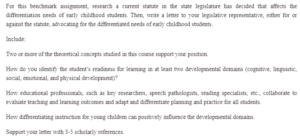Advocating For Early Childhood Students
“The instructional program for prekindergarten and kindergarten should be focused on the children’s ages, interests, abilities, and needs,” according to NYSED’s 100.3 Program Requirements for Students in Grades Prekindergarten through Four (2015). Differentiated teaching to promote the development of new concepts and abilities must be included in such learning situations.” Educators might use Gardner’s Multiple Intelligences and Piaget’s Cognitive Development Theory when creating tailored classes for their students. Gardner’s many bits of intelligence theory enable educators to “create courses that embrace each distinct type of intelligence” (Miniland, n.d.) to educate their pupils to “adapt to their learning strengths” (Miniland, n.d.). Furthermore, Piaget’s theory of cognitive development provides educators with information on how a typical child grows intellectually through each stage.
Furthermore, before giving differentiated instruction to children, we must be aware of their preparedness for learning in several developmental domains. In the Language/Literacy Developmental area, for example, we can read books aloud to our kids to “help prepare children to identify new words from context, as well as enhance their general phonological awareness” (Mead, n.d.). Furthermore, in the Cognition and General Knowledge Developmental domain, educators should encourage their students to ask questions about the world and the mechanisms that control it (Mead, n.d.). Their inquisitiveness “may motivate children to delve into areas that interest them and build background knowledge that will improve their reading comprehension and other key academic abilities” (Mead, n.d.).
With this in mind, educational experts are among the various resources available to assist children with their differentiated needs. Because professionals specialize in a certain field, they may work with educators to design lesson plans that can be effectively taught while also meeting the requirements of each student in the classroom.
Differentiated instruction ” provides equal learning activities that cater to students’ abilities while bringing all students to the same learning target” (Johnson, 2009). Differentiating instruction for early childhood, students will benefit their developmental domains and help them succeed in other topic areas in the long term since lessons and activities are tailored to each student’s requirements.
Overall, I favour adding differentiated instruction into early childhood curriculums. Thank you for your time in reading this message.
References
Johnson, B. (2009, March 3). Differentiated Instruction Allows Students to Succeed. Retrieved from https://www.edutopia.org/blog/differentiated-instruction-student-success
Mead, S. (n.d.). The 5 Domains of School Readiness-And Why They Matter. Retrieved from https://www.whitbyschool.org/passionforlearning/the-5-domains-of-school-readiness-and-why-they-matter
Miniland. (n.d.). How to Benefit from Multiple Intelligence Theory in the Classroom. Retrieved from https://usa.minilandeducational.com/school/how-to-benefit-from-multiple-intelligence-theory-in-the-classroom
Part 100 Regulations. (n.d.). Retrieved from http://www.p12.nysed.gov/part100/pages/1003.html
ORDER A PLAGIARISM-FREE PAPER HERE
We’ll write everything from scratch
Question
Policy and decision-makers do not always understand young children’s development and educational needs. It is the job of the early childhood educator to advocate for the resources required to meet the needs of all students. Early childhood educators should be ready to provide the information policy, and decision-makers must determine the value of differentiated early childhood education programs.

Advocating For Early Childhood Students
For this benchmark assignment, research a current statute in the state legislature has decided that affects the differentiation needs of early childhood students. Then, write a letter to your legislative representative, either for or against the statute, advocating for the differentiated needs of early childhood students.
Include:
Two or more of the theoretical concepts studied in this course support your position.
How do you identify the student’s readiness for learning in at least two developmental domains (cognitive, linguistic, social, emotional, and physical development)?
How educational professionals, such as key researchers, speech pathologists, reading specialists, etc., collaborate to evaluate teaching and learning outcomes and adapt and differentiate planning and practice for all students.
How differentiating instruction for young children can positively influence the developmental domains.
Support your letter with 3-5 scholarly references.

